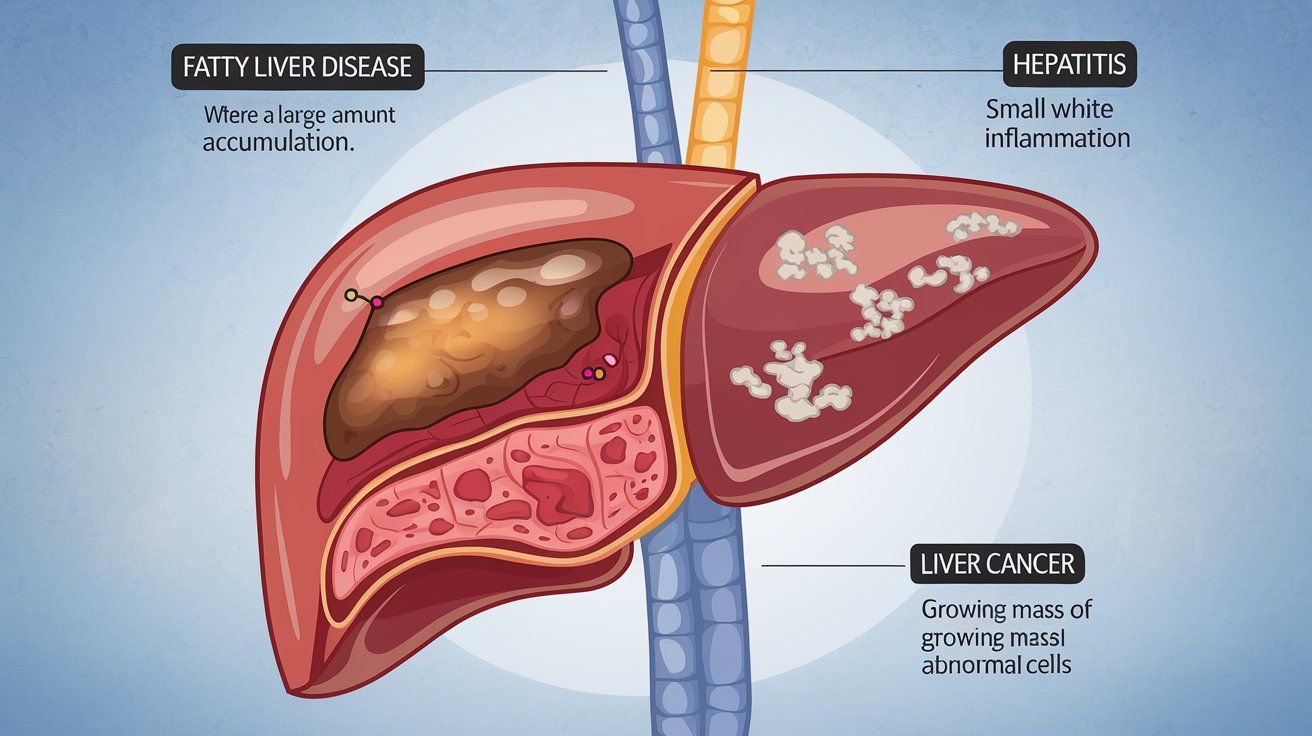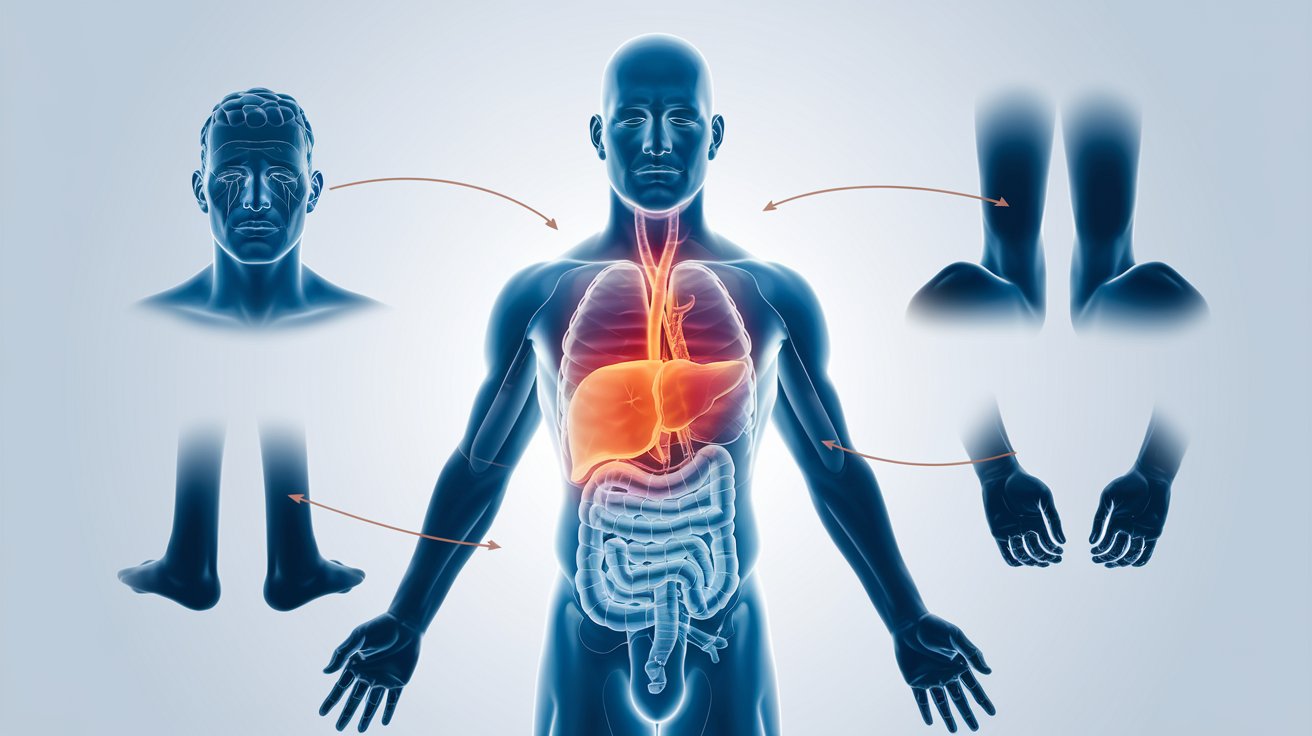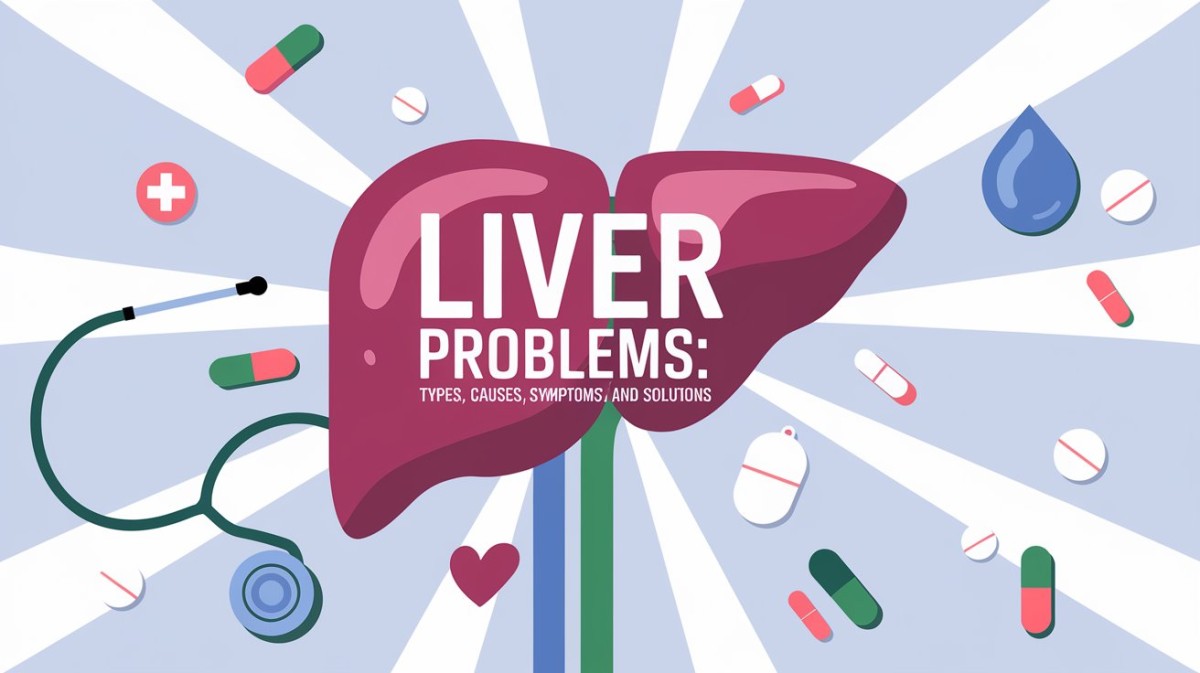The liver, often called the body's powerhouse, performs more than 500 vital functions, including detoxification, protein synthesis, and the production of chemicals essential for digestion. Despite its resilience, the liver is susceptible to various problems that can compromise overall health. How can we recognize these issues early? What steps can we take to prevent them? Let’s dive into the types, causes, symptoms, and solutions for liver problems.
Types of Liver Problems

1. Fatty liver disease also referred to as hepatic steatosis.
❖ Non-Alcoholic Fatty Liver Disease (NAFLD): Consequently, occurred due to the accumulation of fats in the liver and not due to alcohol consumption, usually associated with obesity and diabetes.
❖ Alcoholic Fatty Liver Disease: Related with alcohol consumption in some ways more directly.
2. Hepatitis
❖ Viral Hepatitis (A, B, C, D, and E): The inflammation of the liver due to infections from particular viruses.
❖ Autoimmune Hepatitis: The immune cells start fighting Heath tissues in the liver.
3. Cirrhosis
A long-term disease caused by progressive destruction of liver tissue and subsequent replacement with fibrotic tissue. It may be caused by alcohol, hepatitis, or fatty liver disease, which have caused chronic damage to the liver for years.
4. Liver Cancer
❖ Primary Liver Cancer: Can develop from a body’s own tissues (for example, hepatocellular carcinoma originates in the liver).
❖ Secondary Liver Cancer: It arises from many body parts to the liver.
5. Liver Failure
❖ Acute Liver Failure: Acute liver failure that is mainly precipitated by toxins or an infection.
❖ Chronic Liver Failure: Builds up gradually and accrues with time because of persistent harm.
6. Hemochromatosis
An inherited disorder that results to an overload of iron in the liver and resultant injury to cells.
7. Wilson’s Disease
An autosomal recessive disorder through which copper builds up in the liver and in other organs.
Common Causes of Liver Problems
Alcohol Consumption
Studies have also shown that alcohol consumption and alcoholism is capability of causing liver related diseases such as alcoholic fatty liver, hepatitis and cirrhosis.
Obesity and Poor Diet
Unhealthy diets entail high amount of fat and sugar that lead to NAFLD and other severe liver diseases.
Viral Infections
Serum hepatitis viruses A, B and C are capable of causing acute and chronic liver inflammation and disease.
Medications and Toxins
This organ is injured by excessive use of drugs such as acetaminophen or contact with chemicals used in industries.
Genetics
Diag- Examples include; hemochromatosis and Wilson’s disease; Conditions that lead to this include;
Autoimmune Disorders
Autoimmune hepatitis result from immune system failure that targets the liver cells.
Lifestyle Factors
The health of the liver can be worse off through the various activities such as, being desk bound, smoking and drug use.
Symptoms of Liver Problems

Liver problems often manifest subtly at first, but as they progress, symptoms may include:
❖ Fatigue and weakness.
❖ common cold, influenza, and jaundice.
❖ Dark urine and pale stools.
❖ Abdominal pain or swelling.
❖ Nausea and vomiting.
❖ Itchy skin.
❖ Loss of appetite.
❖ Oedema of the lower limbs.
Diagnosing Liver Problems
Timely diagnosis is therefore important so that liver diseases can be well addressed. Common diagnostic methods include:
Blood Tests:
❖ Other tests to see levels of enzymes in the liver such as liver function test.
❖ These include complete blood counts mainly the CBC and some coagulation test.
Imaging Tests:
Ultrasound, lowosopheric CT scan or MRI to look for structural changes in the liver.
Liver Biopsy:
❖ Spit is collected for analysis for certain diseases by taking a small tissue sample.
FibroScan:
Uses elastography to establish fibrosis or cirrhosis of the liver.
Treatments for Liver Problems
Lifestyle Modifications
❖ Healthy Diet: Fruits vegetables whole grain and lean proteins aid the liver while bad foods harm it. Stay away from any foods that contain trans fats or are processed.
❖ Regular Exercise: It assists in a reduction of fat in the liver, and may prevent obesity.
❖ Limit Alcohol: Reduce or eliminate alcohol intake from your diet completely.
Medications
❖ Antiviral Drugs: Among patients with hepatitis B and C virus exposure.
❖ Chelation Therapy: For chelating in cases of load iron or copper in genetic diseases.
❖ Steroids: About autoimmune hepatitis inflammation is the main problem and treatment will be aimed at decreasing this parameter.
Surgical Interventions
❖ Liver Transplant: For terminal liver illnesses such as serious cirrhosis or liver failure.
❖ Tumor Resection or Ablation: For liver cancer cases.
Preventing Liver Problems
❖ Vaccination: Hepatitis A and B should be prevented; hence, you should opt for a vaccination.
❖ Safe Practices: Hepatitis C is spread through contact with infected blood, so do not use the same syringe as someone else or use the same razor or toothbrush, and do not have unprotected sex with multiple partners.
❖ Moderate Alcohol Use: Stick to recommended limits.
❖ Mindful Medication Use: Do not take too much acetaminophen, aspirin or ibuprofen and herbal supplements.
❖ Hygiene and Sanitation: Protect against hepatitis A and E and drink clean water and eat foods which are prepared and sold with nutritious content.
Home Remedies for Liver Health
Coffee Consumption
A moderate consumption of coffee reduces the incidence of liver disease.
Turmeric
Has curcumin which has a quality that protects the liver from inflammations.
Green Tea
Rich in antioxidants that help the liver to eliminate toxins from the body.
Lemon Water
Stimulates the secretion of bile and improves the process of digestion.
When to See a Doctor
Contact your healthcare provider if you continue to have signs such as jaundice, severe or persistent belly pain or confusion. There can be no overemphasizing the old saying that an ounce of prevention is worth a ton of cure.
For such more related content don't forget to check out our blogs on Treatments
Conclusion
Liver is one of the most important organs of the human body which also needs to be taken care of. It is good to note that; healthy lifestyle practices, close follow up of the risk factors, and early seeking of medicalCheck service can effectively avert liver complications. Bear in mind now that the health of liver goes hand in hand with the health of your overall body.

